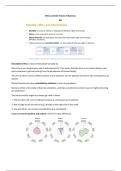Ethics and the Future of Business
W1
Descriptive ethics is about what people actually do.
Ethics has a very long history, and is anthropocentric. This means that the focus is on human beings, and
ethics examines right and wrong from the perspective of human beings.
The aim of ethics is also to affect practice, and in business, we are typically focused on the consequences of
actions.
Ethical theories can have contradictory solutions to the same problem.
Business ethics is the study of business situations, activities, and decisions where issues of right and wrong
are addressed.
The law and ethics might not always go hand in hand:
1. The law does not cover all ethical issues (e.g. cheating on your partner).
2. Not all legal issues are ethical (e.g. driving on the right side of the road).
3. Law and ethics can involve contradictions (e.g. Apartheid).
Regarding moral machine and culture: there are many difference.
,We move to normative ethical theories.
• The first perspective is that of ethical egoism.
Adam Smith in his book wealth of nations makes a point: everybody goes for their own, so the economy
works. He talked about the invisible hand of the market taking care of everything. Note that in another
book he argues that ethics is a relational phenomenon (interpersonal).
An action is morally right if the actor aims to pursue their self-interest, either short term or long term.
But you can get in contradiction with morality if ethical egoism is followed. Anything goes, so even if, say,
murder is serving one’s self-interests, then it is accepted.
Thus, amoral view based on short term satisfaction of needs is contradictory with our moral principles.
Enlightened egoism focuses on the meeting of long-term human interests. However, even so, does not
take a stance on the nature of the interests and desires of individuals, which can still lead to problems due
to conflicting interests.
Although taking care of your needs and interests is morally important, the theory needs to be
complemented by more developed ethical theories.
• Utilitarianism is about the greatest number of good for the greatest number of people.
So it is about consequences for everybody.
Utilitarianism is very influential in normative economics, which is related to the egoistic view of humans in
economics.
Egoism in economics tends to function within a utilitarian societal moral theory.
Act utilitarianism is about one particular situation. Do you accept something in a particular situation?
Whether a single act is right or wrong depends on the amount of common good it produces.
Rule utilitarianism is about whether something is acceptable at all, in any given situation. Focuses on
creating rules that produce the most common good.
In practice, utilitarianism becomes an analysis of advantages and disadvantages, a cost/benefit analysis.
Problems of utilitarianism include:
- It is hard to understand all consequences of an action.
- It can be in contrast with basic rights. For instance, would you kill innocent people do eliminate a
high value target?
, Moreover:
According to rule utilitarianism, self-driving vehicles should minimize casualties. They should be introduced
only if they are likely to make driving in general safer.
• Ethics of duties
We need to decide, according to Kant, the principles that we would apply in every situation. These are
called categorical imperatives.
Central concepts to Kant’s moral philosophy are duty, consistency, dignity, and universality.
Duties do not mean mechanistically following rules, but they involve human’s ability to develop moral law
and moral rules.
Categorical imperatives include:
Universal applicability means: check whether what you do is acceptable for everybody.
Tomorrow’s newspaper test: if everything that happened was written in tomorrow’s newspaper exactly as
it happened, would you be ok with it?
Problems include:





